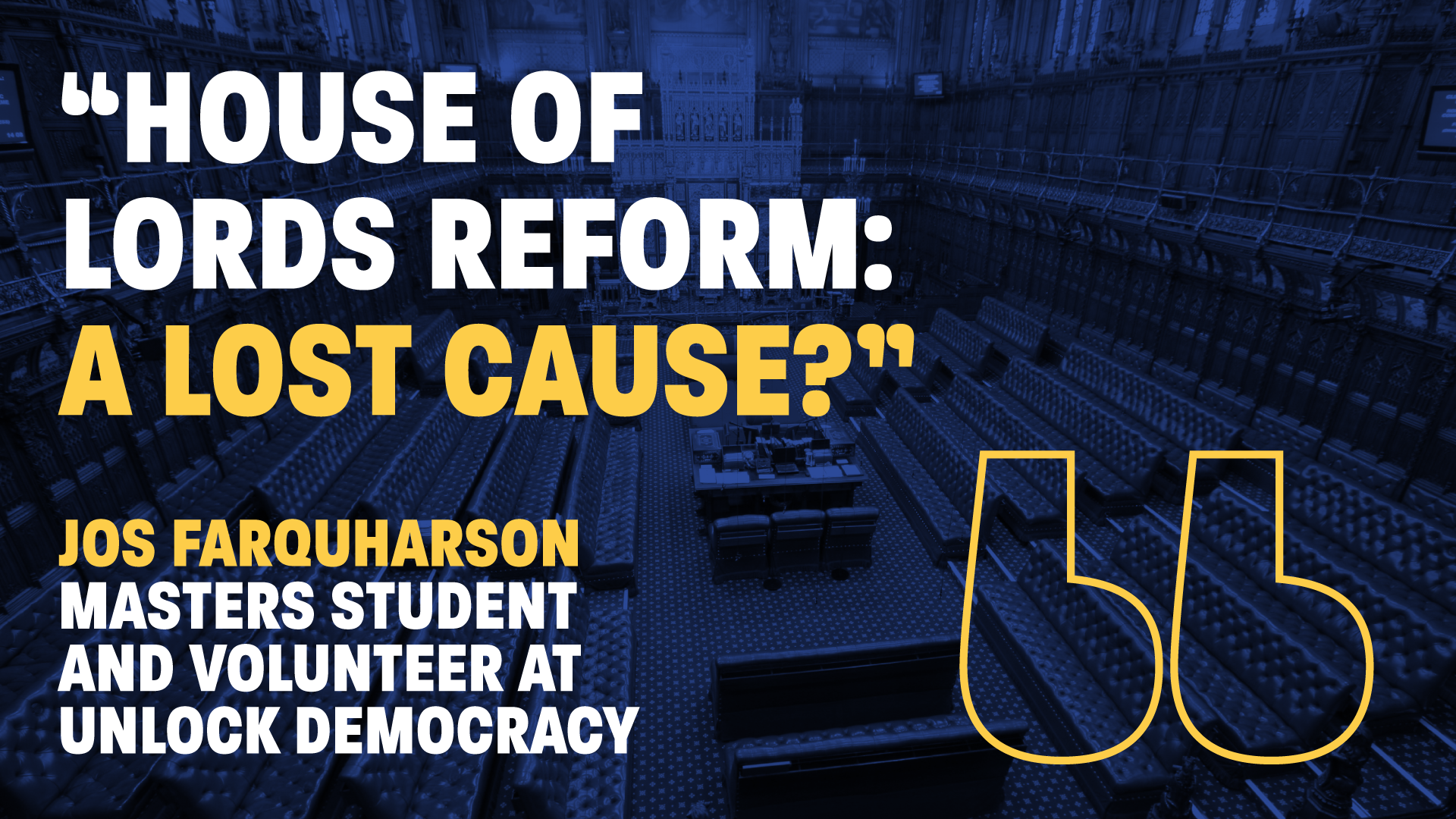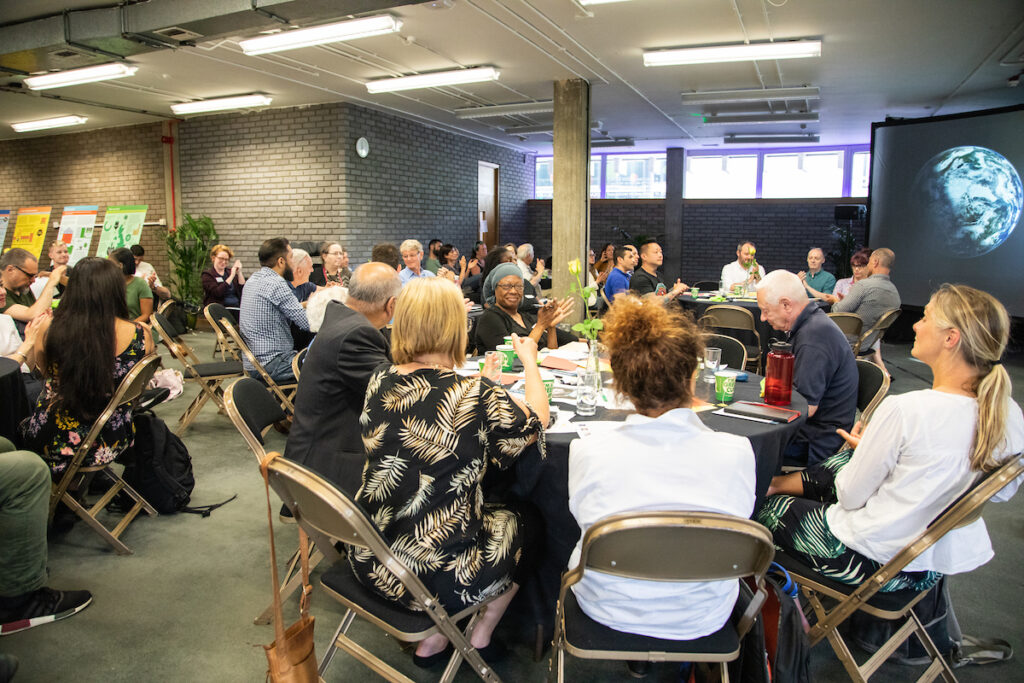House of Lords Reform – a Lost Cause?

After years of repeated disappointment and ineffective action, discussing House of Lords (HOL) reform almost feels like a lost cause. Both experts and the public largely agree that our second chamber is a painfully outdated blot on democratic accountability and credibility, but this is yet to inspire the drive for change that so many of us desire.

After years of repeated disappointment and ineffective action, discussing House of Lords (HOL) reform almost feels like a lost cause. Both experts and the public largely agree that our second chamber is a painfully outdated blot on democratic accountability and credibility, but this is yet to inspire the drive for change that so many of us desire.
However, with recent controversial Lords’ appointments reigniting discussion across the country, and the prospect of fresh faces in government following the upcoming general election, now is the time to finally rediscover our hope.
To say that HOL reform is ‘urgent’ is an understatement.
Firstly, few dispute the important roles it plays in legislative scrutiny and providing checks on the first chamber. Successive governments grudgingly accept that it does a good job on this front. However, few upper houses are as contentious as the HOL, owing to its controversial composition and dubious methods of appointment. Reformers are therefore primarily focused on the democratic legitimacy of its membership rather than the authority of its output.
HOL members are to date entirely unelected (if the farce that is the election of hereditary peers from amongst other hereditaries is overlooked), a majority of whom have membership for life, creating the only upper house in the world larger than its lower house counterpart.
Without an independent body tasked with selecting all new entrants (the HOL Appointments’ Commission only selects the non-party political life peers), those members are almost exclusively chosen by the Prime Minister and other party leaders.
This process often rightfully sparks uproar, as successive PMs stuff the chamber with their own party affiliates, trying to sway the balance of its voices in their favour. These party supporters are often tarnished by associated ‘cash for honours’ scandals, highlighting the inability of the current system to promote peers of suitable quality and expertise.
Clearly one does not have to be particularly discerning to understand the blatant lack of accountability or fair representation that’s baked into this important institution. As an entirely unelected body, the House of Lords lacks the democratic legitimacy to robustly challenge legislation and will always be open to the challenge that it is undermining the will of the people when doing so.
What’s equally worrying is the impact this has on public attitudes towards our democracy, at a time when disaffection with British politics is spiralling to an all-time low. However, despite polling showing the unpopularity of many of the HOL’s features, the issue is often overshadowed by more material, hot-button concerns.
Windows of opportunity are therefore paramount; there is no better time to act than right now.
Calls for reform are divided between a number of alternatives: a wholly elected chamber, a partly elected chamber or a citizens’ assembly.
The suggestion of territorially designated representation within a new chamber, most notably in Gordon Brown’s ‘Assembly of the Nations and Regions’, also deserves consideration. The Lords should, as a priority, be complementary to the Commons. This suggestion would not only help achieve this, but also provide much needed support to the ongoing devolution process. Germany’s highly successful Bundesrat is a perfect example of this.
A second chamber that’s 100% elected would, of course, be the optimal choice for democratic legitimacy, ensuring all lawmakers are chosen by the people. Unfortunately though, this option is fraught with challenges.
For one, the Lords plays a crucial role in legislative scrutiny, a task that relies on seasoned expertise and specialist knowledge which may be lost with exclusively elected members.
A complete personnel overhaul could also cause considerable disruption, and there are worries that competitive gridlock between the two houses could arise with HOLs’ members fully elected. Nevertheless, such chambers play vital roles in the US and Australia, and precautions are taken to prevent them from challenging the primary house.
A citizens’ assembly would introduce a fresh perspective and genuinely inclusive democracy to top-level politics, where selection opportunities are handed directly to ‘ordinary citizens’, somewhat reminiscent of a court jury. This system has been used in Canada, Ireland and France amongst others, inviting societally representative samples of citizens to deliberate over policy changes.

Camden Citizens’ Assembly on the Climate Crisis
However, the inexperience of new citizens’ assembly members in conducting detailed analysis on complex legislative or technical issues (particularly if they are selected for short terms of just one or two years), would likely necessitate a substantial shift in the body’s role.
More optimism can be located in a partly elected chamber, which may represent a more well-rounded choice too. In striking a balance between appointed expertise and elected accountability, this option has found significant cross-party support in recent years, and is a common choice for upper houses around the world.
An 80% elected and 20% appointed 450 seat chamber, for example, would be sufficient to conduct the Lords’ current scrutiny functions, whilst remaining largely accountable to the public. Fixed terms, of fifteen years, with five-year election cycles (with a third of the peers elected each election cycle) would ensure that the Commons maintains a more recent and powerful collective mandate. This would help protect the harmony between them and permit members of the HOL to hold a longer outlook and gain greater independence from their parties.
It is perhaps no surprise, then, that a 2012 bill of this nature won an enormous second reading majority in parliament and full endorsement from the then cabinet.
Just over ten years later, the determined work of our community – The Sortition Foundation, The Electoral Reform Society, Unlock Democracy and Compass to name a few – continues to breathe life into this discussion.
There should therefore be no reason to reserve our ambitions moving forward.
Whilst the House of Lords certainly carries out important functions, public surveys show a worrying level of distrust in parliament as a whole. Without trust, our democracy simply cannot deliver in the way that we desperately need it to. The second chamber’s undemocratic nature and archaic characteristics remain an obstacle to rebuilding trust.
With consensus that change is needed, together we must make the inevitable the immediate, and prove that HOLs’ reform isn’t a lost cause, but an idea whose time has come.
If you want to play a part in turning this vision into a momentous reality, join The Democracy Network, plus the Unlock Democracy campaign for ‘powering up’ our democracy.
Join Unlock Democracy’s campaign to Power Up Democracy
References
Meg Russell. ‘Representing the Nations and Regions in a new Upper House: Lessons from Overseas’, The Constitution Unit.
Meg Russell, 2023. ‘House of Lords reform: navigating the obstacles.’ Review of the UK Constitution: Guest Paper, Institute for Government.
Paul Tyler, et al., 2007. ‘Reforming the House of Lords: Breaking the Deadlock.’
Paul Tyler, 2015. ‘House of Lords reform was within reach but Labour blew it’, The Guardian. Available at: https://www.theguardian.com/politics/2015/feb/11/house-of-lords-reform-was-within-reach-labour-blew-it.
Philip Norton, 2020. Reform of the House of Lords. Manchester University Press.
Office for National Statistics, 2022. ‘Trust in Government: UK 2022.’ Available at: https://www.ons.gov.uk/peoplepopulationandcommunity/wellbeing/bulletins/trustingovernmentuk/2022#:~:text=Levels%20of%20trust%20in%20political,they%20trust%20the%20Civil%20Service.
The Sortition Foundation, 2023. ‘Replace the House of Lords with a House of Citizens.’